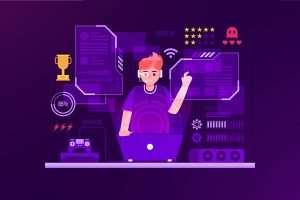Artificial Intelligence and Machine Learning have emerged as explosive technologies now profoundly impacting mobile application development. As AI/ML advances accelerate, integrating their expansive capabilities into apps is instrumental for creators seeking to keep pace with user expectations for intelligent, hyper-personalized and futuristic digital experiences.

This guide explores 12 catalytic ways AI and ML infusion is transforming mobile app development and design for next-generation engagement.
1. Predictive Personalization
Leveraging recommendation engines to anticipate user needs and surface personalized content or functionality without explicit input.
Transforming apps through:
- Contextual suggestions
- Pre-emptive notifications
- Adaptive layouts and flows
Pros
- Delightful experiences
- Time savings
- Improved conversions
Cons
- Could enable manipulation
- Inaccuracies frustrate users
- Erodes serendipity
2. Immersive Voice and Chat
Processing natural language via voice input or messaging conversations to handle sophisticated informational queries or accomplish multi-step tasks.
Transforming apps through:
- Conversational UI adoption
- Virtual assistants integration
- Expanded accessibility
Pros
- Intuitive hands-free control
- Wider device support
- Cuts interface clutter
Cons
- Speech recognition limitations currently
- Heightened battery drain via microphone
- Raises ease of surveillance fears
3. Lifelike Avatar Assistants
Visually appealing animated characters able to perceive environments and users through cameras/sensors to enable interactive conversational help.
Transforming apps through:
- Emotion simulation building rapport
- Non-verbal communication cues
- AR-based contextual guidance
Pros
- Personalized bonding
- Boosts perceived utility
- Guides user journeys
Cons
- Uncanny valley effect potential
- Engineering complexity
- Could frustrate some segments
4. Intelligent Process Automation
Automating repetitive workflows like booking travel, submitting applications or researching purchases via apps through robotic process automation techniques.
Transforming apps through:
- Simplifying multi-step tasks
- Pre-filling forms
- Comparative analysis
Pros
- Effort and time savings
- Curates best options
- Optimizes spend
Cons
- Could foster laziness
- Exposes us to manipulation
- Accountability issues
5. Emotion and Sentiment Detection
Analyzing user emotions and communication sentiment via speech patterns, facial cues, psycholinguistics and contextual data to appropriately align responses or customize experiences.
Transforming apps through:
- Video calling enhancements
- Empathetic conversational interfaces
- Mood-based recommendations
Pros
- Boosts human relationships
- Surfaces psychological insights
- Fosters healthier digital habits
Cons
- Inaccuracies are alienating
- Biometric privacy risks
- Potential emotional manipulation
6. Democratized App Creation
Low-code/no-code development platforms enabled by ML to autocomplete code, generate templates and accelerate programming to expand app creator access.
Transforming apps through:
- Visual workflow modeling
- Recommended design patterns
- Automated debug scanning
Pros
- Puts development within reach of non-coders
- Frees developers to focus at higher levels
- Test cycle times reduced
Cons
- Still maturing reliability
- Risk of deskilling coders
- Governance and security challenges
7. Continual Learning Models
Enabling apps to keep improving autonomously based on new data without explicit retraining or version updates through techniques like online machine learning and transfer learning.
Transforming apps through:
- Evolving personalized recommendations
- Self-updating digital assistance
- Evergreen feature enhancements
Pros
- Cuts disruptive updates need
- Responsive to user signals
- Enhances utility over time
Cons
- Increases opaqueness
- Monitoring continuity challenges
- No final “done” state
8. Reinforcement Learning Application
Optimizing apps to maximize goals like sales conversions, retargeting probability or likelihood of continued usage through trial-and-error based feedback.
Transforming apps through:
- Dynamic real-time content sequencing
- Personalized push notification timing
- Optimized in-app purchase bundles
Pros
- Goals-based automation
- Improves outcomes
- Algorithmic efficiency
Cons
- Perpetuates harmful biases
- User agency conflicts
- Poor explainability
9. Computer Vision Integration
Image, video and spatial sensing via device cameras and sensors to enable environmental awareness, facial/object recognition and contextual triggers for interactive functionality.
Transforming apps through:
- AR experiences
- Biometrics authentication
- Contextual notifications and features
- Pros
Immersive real-world blending
Frictionless access control
Situational personalization - Cons
Battery drain via sensors
Accuracy deficiencies early on - Privacy overreach fears
10. Edge Computing Leverage
Performing processing like AI inferencing directly on devices leveraging native hardware improvements for speed, personalization and reliability gains vs cloud dependency.
Transforming apps through:
- Smoother core functionality offline
- Enhanced data security
- Faster response latency
Pros
- Mitigates disruptions
- Data privacy preservation
- Wider emerging market reach
Cons
- Legacy device support drops
- Maintaining consistency challenges
- Costs of scaling in aggregate
11. Generative Media Capabilities
Automatically generating images, videos, sounds and text on demand using generative adversarial networks and related deep learning techniques.
Transforming apps through:
- Custom photo/video generation
- Dynamic audio production
- Text-to-visual concept rendering
Pros
- Democratizes creativity
- Cuts production hurdles
- Enhances visual communication
Cons
- Copyright conflicts and attribution
- Threatens creative industries displacement
- Misuse potential still concerning
12. Quantum Computing Integration
Tapping exponentially greater computation scale of quantum systems accessible via cloud allows otherwise impossible ML model complexity and speeds for transformative app experiences.
Transforming apps through:
- Previously unsolvable optimization tasks
- Ultra-efficient recommendations
- Breakthrough medical insights
Pros
- Scales new solution frontiers
- Supercharges analytics
- Fuels leaps in ML efficacy
Cons
- Nascent integration maturity presently
- Significant access barriers near term
- Optimal application areas still actively unfolding
By harnessing the increasing power of artificial intelligence and machine learning, mobile creators gain extraordinary capabilities to craft intuitive, delightful and helpful user experiences – while future-proofing apps against the risk of stagnation. Competitive differentiation and value creation for mobile users now revolves around intelligence and personalization.




Pingback: Green Tech in Mobile App Development: Sustainable Solutions for a Digital Future - Quick Startapps
Pingback: Evolution and Impact of AI on Mobile App Development - Quick Startapps